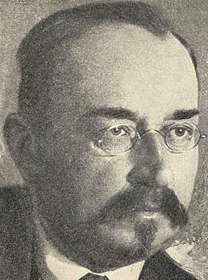Nikolai Aleksandrovich Rozhkov
Nikolai Rozhkov (1868–1927) (Russian: Николай Рожков) was a Russian historian who became an active revolutionary in the Russian Social-Democratic Labour Party (R.S.D.L.P.).

In 1905 Rozhkov joined the Bolshevik faction of the R.S.D.L.P. At the 5th Congress of the Russian Social Democratic Labour Party he was elected as a full member of the Central Committee. However by 1907 he had fallen out with Lenin who maintained for him an enduring hatred.[1]:4
Rozhkov's struggle for a legal party
In February 1911 he submitted an article entitled "An Essential Initiative" to the legal Bolshevik paper Zvezda.[2] Here he argued three points:[2]
- The aristocracy no longer had a monopoly of power but were facing a losing struggle against the rising bourgeoisie
- The bourgeois were stabilising their power even though such parties such as the Kadets, Trudoviks, Octoberists, Renovationists were still illegal.
- That the socio-economic development of Russia was comparable to that of Prussia in the 1880s, and that there was not a general sentiment in favour of revolution in Russia, although there was much unrealistic support amongst those in exile.
Zinoviev responded to the article with a somewhat stern but friendly letter which reproved Rozhkov for his position, which he saw as comparable to the liquidationists.[2] Rozhkov refused to give up his ideas, and wrote a second article "A System of Operation" in which he had advocated the establishment of an organisation called "The Political Society for the Protection of the Interests of the Working Class". He hoped this organisation would spread through workers organisations such as co-operatives and trade unions, eventually to establish itself as a political party in the Duma.[2] In a third article, "The Struggle for Legality". These three articles eventually drew a response from Lenin in which the later declared that Rozhkov as a legalist was no different from a liquidationist. But Rozhkov was not scared of being called by such a name.[2] Rozhkov then wrote "The Contemporary Situation in Russia and the Fundamental Task of the Working Class Movement in the Present Moment". In the end the Bolsheviks refused to publish his articles, and this last article appeared in Nasha Zarya.[2] Whereas previously the argument between Lenin and Rozhkov had been through private letters. However Lenin now responded with "A Liberal Labour Party Manifesto" published in Zvezda No. 32, December 3, 1911.[2][3]
After 1917
Deputy Minister of Post and Telegraph (May–July 1917) of the Provisional Government.
References
- Rondan, John Antonio Gonzalez (1996). Nikolai Aleksandrovich Rozhkov (1868-1927): historian and revolutionary. Wollongong: Department of History and Politics, University of Wollongong. Retrieved 9 August 2017.
- González, John A. (2016). An Intellectual Biography of N.A. Rozhkov: Life in a Bell Jar. Brill.
- Lenin, V.I. "Lenin: 1911/lilapman: I". www.marxists.org. Retrieved 14 August 2017.